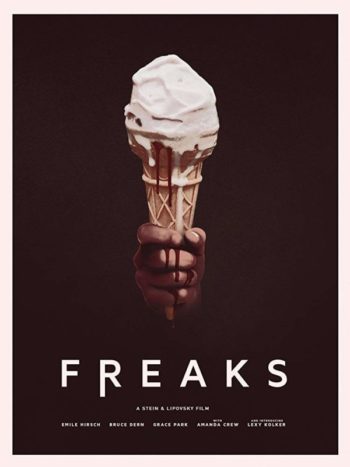
This interview contains possible spoilers
I saw a lot of movies I loved at the London leg of FrightFest, though none quite topped Freaks for me – which I caught during the Glasgow event. The four horsemen were evidently impressed too as it got another screening in London, due to popular demand – which it sold out immediately. It’s among my best the year thus far, and an outstanding combo of horror and science fiction. As such, I was delighted to have the opportunity to speak with co-writer/ co-director Zach Lipovsky who was there for this second screening. We talked about writing it, funding it, filming it and what happens next. Please note that due to the nature of the film, I’ve made some significant edits to our conversation where I felt we were too spoiler heavy. However, we still discussed the character arcs so if you don’t want to know the direction it goes then read no further.
So let’s do the most obvious question first: where did this story come from?
It came from a whole bunch of places, But I co-wrote it with my best friend Adam, and when we did it he had a five-year-old son. And we were just really fascinated by the perspective of a child. To him, what was real and what wasn’t was mysterious: dreams aren’t real, but that weird sound down the block is real even if we never see it. We wanted to tell a movie from that perspective and be true to that perspective so the audience can experience it like a kid. Because when it’s a sci-fi world we don’t know what the rules of the world are.
Being conscious of spoilers, it’s interesting how you ease the audience into the world. We have this father-daughter relationship that we think is one thing, then it’s not.
Out of curiosity, what did you think it would be?
I thought it was going to be an abduction story. But then while the dad is behaving questionably, it’s clear he’s still acting rationally and in her interest.
We were really aware this would be a really small movie, but we wanted to get big actors. So we knew from the beginning that we had to write characters that were really, really juicy, interesting and conflicted. They weren’t all good, and they weren’t all bad so that big actors, even if they weren’t going to make a lot of money, would look into these characters as people they’d want to bring to the screen. Because they’re doing things that you like, things you don’t like, but you understand why they do them.
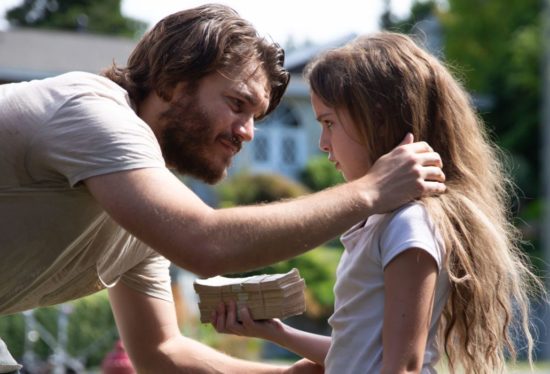
With the father and daughter relationship is the heart of the film, it must have been a heck of an audition process
Oh yeah, when we finished the script we asked if we were really stupid: writing this film that stars a seven-year-old, who isn’t just in every scene but says most of the dialogue. Because we watched a bunch of movies with kids and realised in most of them they don’t say a lot. In some, it’s all voiceovers and they don’t actually say anything. And we ended up searching over North America ‘til we had like 12,000 tapes we kept narrowing down. We eventually found Lexy and she was able to do something that almost none of the other kids could do: she could connect to her real emotions.
I saw you auditioned her with improvised scenes
Yeah, it’s a technique we used because a lot of kids come over-rehearsed so they lose the meaning. It’s a science fiction movie, but the whole point was to take a very real feeling premise and apply it to this world – so we needed the performances to feel almost like a documentary. And kids don’t do that naturally so we connected to real things from the actors’ lives. So we asked her “when was the last argument you had with your dad?” And then we improvised that argument from her real-life so she’d feel those real emotions then start doing stuff with the dialogue from the film but already in that place.
Did you allow much improvisation on set?
Yeah, we had Bruce Dern and he’s known for his Dernseys. And we were the writer/ directors, and there was nobody to tell us what to do, so we had the freedom to change things when we knew we needed to or to give them the freedom to explore what else could happen. But then we knew what was important in every scene, so it was a combo. Most of the scripted lines are in the movie, but there’s also a lot we didn’t script which added flavour around the ones we did. We did that because it added a sense of realness.
Was the film always intended to be small, or was this because of budgetary issues?
It was very deliberate for both reasons. Adam and I had tried to get many movies made, and they all failed because we needed more money than we had. Then we saw the speech Mark Duplass gave at South by Southwest when he said “go make the movie with all the resources you have right now. Stop trying to make movies with what you don’t have because you won’t make it”. His first movie was about a puffy chair and a van because that’s what he had. Then he and his brother starred in it and it went to Sundance. So we started with that premise: let’s make the movie for literally zero. Adam was going to be the father, and I’d be the uncle who eventually became the grandfather, and his kid would be the kid. So we wrote the script knowing that if we had to we could shoot it in his house with us doing it and nobody else’s help. Luckily as we worked on it people got excited by it, and we got Bruce Dern which helped us make it bigger. But from the very beginning, it was meant to be small.
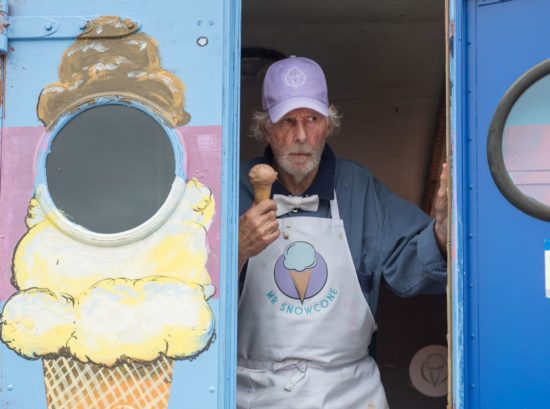
It’s great how you were able to still do cool action sequences at this scale
The spectacle doesn’t work in any way, whether you have a lot or a little bit of money unless you care about the people. There’s this quote from JJ Abrams about Star Trek when he says “we’ve seen Spacehsips narrowly avoid asteroids or whatever hundreds of times – that doesn’t do anything for us any longer. But if you really, really care about the people in that ship you’ll be at the edge of your seat when that asteroid goes past”.
That’s true – even in the weaker Treks, as long as you have this essential trio of McCoy, Kirk and Spock you’re invested
If you care about the people then any jeopardy they’re in matters – here you’re immediately worried about this girl. You don’t know what’s going on, but you’re worried about her. Outside, is it dangerous or not?
Then you got those connotations of a guy wanting to help her luring her into an icecream van.
We think people will pretty quickly settle into their seats assuming we’re never going to leave the house. Then she leaves like 20 minutes in and you’re wondering what’s going on. We liked the idea that you really wanted her to get out the house, then as soon she does you really want her to go back in.
How’s the collaborative process between you and Adam vs when you’re by yourself?
Especially writing by yourself is incredibly difficult: it’s just you and a blank page and its very different to know what’s working and what isn’t. But if you have two people you can call each other on your bullshit very easily. It’s very easy to think ‘that works’ or ‘that doesn’t make sense but nobody will notice that’. But they always notice, so if you’ve got someone else to throw things back and forth and makes the writing so much easier and the product so much better. We like to think it means you have twice the directing power rather than two halves of a director.
Do you have a system for resolving any tensions?
Most of the time we see everything that same, but there’s 5% of the time when there’s something we don’t see eye to eye on. Part of the reason we partnered was how rewarding it was on the smaller projects when we both got through that. It would be something like I’d think an actor should stand by the window, and he’d want them by the door, and we’d ask why the other thinks it’s so important that they stand where they do. It’s not about the window, but the reason why the window that’s important. And once you find out these ideas details there’s usually a third idea that incorporates whatever the important elements are that’s way better than either idea itself. So instead of choosing my idea or his, we’d always look for a third that accomplishes both things and it’s always better than anything either of us could come up with. It gets addictive because you’re always finding ideas that are better than yourselves.
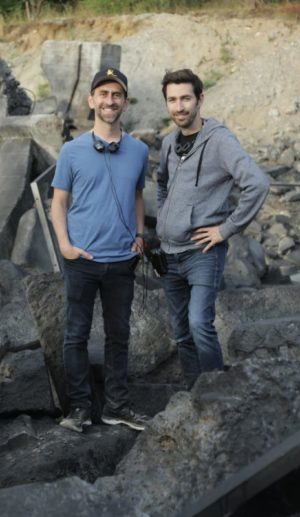
How did Freaks compare to working with an established brand, like when you did Leprechaun: Origins or Dead Rising: Watchtower?
The reason we did this film was I’ve had a career directing other people’s projects – some went well, and some really did not – and the whole point of making this movie was to show the world what our voice was. But also to be able to build our own world. I love the world of Dead Rising – I think it’s really cool, and I enjoyed doing my own thing with it. But getting to build your own world is way better and there are many, many details in the film people may never notice but they’re part of what we designed. When we first showed the film, one of the first reviews highlighted a very small detail and it made us cry because we never thought it’d… When you’re writing a film in a coffee shop you never thought people will see it. Then you never think reviewers, like yourself, will see it. But then you do and you notice tiny, tiny details we slaved away at to get into the film. For that to affect people is very, very powerful.
I’ve not seen your Leprechaun film but know someone who loves it.
(Laughs) It’s a pretty divisive movie. I tried to do the best I could and generally, it’s despised. But when you’re starting out as a filmmaker you’re trying to get any job you can so when somebody says they want to hire you to do a movie you don’t even care what it is. And I learnt a lot of lessons. In that case, it was mostly that the people in charge didn’t want to make a great movie, so it was very difficult to make one under those circumstances.
I was looking into the advertising and saw you set-up a mock hotline for people who had experienced paranormal encounters.
We did a lot of world-building when we made this movie, and we thought a lot about what happens in the real world and what would happen with the situation from our movie. Then tried to draw from every angle – sometimes propaganda to explore this state of fear. We looked at all the examples of that and tried to apply it to our world.
I think people also connect with the film being about outsiders. For instance, one reviewer had a take on the movie as an allegory for autism and neurodiversity.
We wanted it to be about any outsider – we didn’t want it to be about specific ones. I wonder if that writer has had direct or indirect experience with autism – because what we noticed is everyone brings their own experiences which is really interesting. And everyone’s been an outsider in some way, maybe because of their ethnicity, the country they were born in, the type of parents they had or the things they like. Everyone’s different from everyone. We looked at the way people have been subjugated, persecuted or segregated because they were different and we didn’t want it to be about any particular one. We were writing the movie during Trump’s campaign and there was a lot of feelings of xenophobia that fed into the movie. But then I’m from Canada and we have a long history of when Aboriginal children were separated from their families and were then put in schools to “get the savage out of them”, and the same thing happened with Jewish kids. People from Canada saw the Canadian thing and Jewish people saw the Jewish angle so it was interesting.
It’s become prophetic with what’s happened with Trump
The crazy thing is we wrote this before all that, then when the movie came out last year at the Tribeca Film Festival just as all that was happening and people were shocked and appalled then asking how we knew this was going to happen. The sad thing is we just looked through history – we had a long conversation while we were writing the movie about how Trump’s not going to be elected so this movie might not be relevant. Because all this feeling of injustice and persecution may not be relevant in two years but its, unfortunately, become more. It was science fiction when we wrote it but two years later it isn’t.
Finally, without spoilers, I like that the more we get to know, the more ambiguous it gets
We always knew we wanted it to end in a way that makes people wonder what they’re rooting for. It’s like the cycle of violence – we wanted to create this world where it gets worse and worse, with everyone doing worse things to each other. It’s like when I was talking about how we wanted every character to be both good and bad, most start bad but turn good while with one character we wanted the audience to ask what the world had turned them in to. Everyone likes to think the villains are bad apples, but is it the world that creates them?
With this in mind, do you think we’ll see what happens next?
Yeah, we’ve got lots of ideas we’d like to do – it depends if people show up. If people watch it and demand more, then we’ll be able to make more. It’s a small movie and we need all the help we can get getting the word out.
Freaks will be out in America on September 13, 2019. For information about a UK release, watch this space.
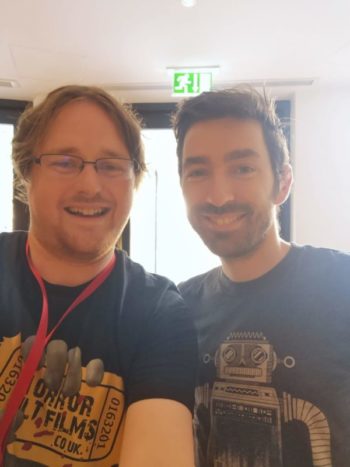


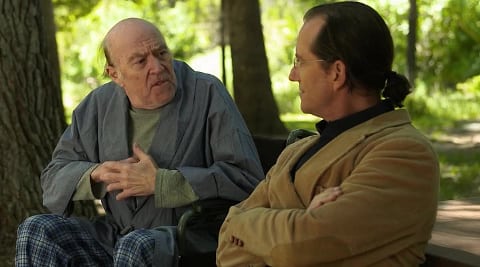
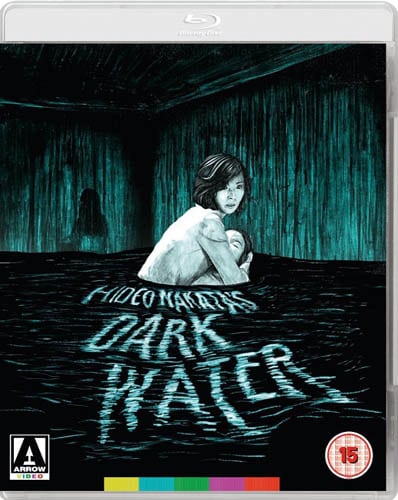
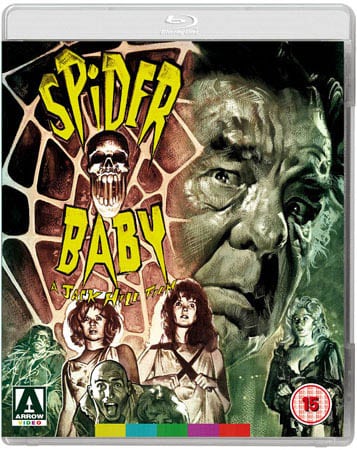
Be the first to comment